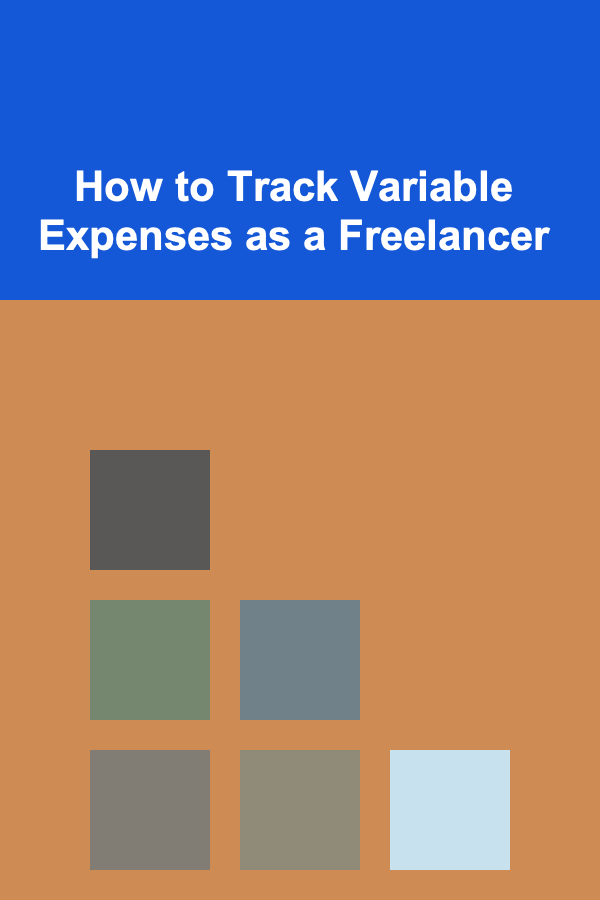
How to Track Variable Expenses as a Freelancer
ebook include PDF & Audio bundle (Micro Guide)
$12.99$11.99
Limited Time Offer! Order within the next:

Freelancing offers a unique combination of flexibility and independence, allowing you to choose the projects you work on and determine your schedule. However, with these benefits comes the challenge of managing your finances, especially when it comes to tracking variable expenses. Unlike a salaried position, freelancers face a more unpredictable income stream and a broader range of fluctuating costs. Therefore, understanding how to track variable expenses effectively is crucial for maintaining financial health and ensuring sustainable business growth.
This article will explore the importance of tracking variable expenses, provide practical methods to manage them, and offer insights on how to stay financially organized. Whether you're just starting out as a freelancer or have been in the game for years, mastering the art of managing your variable expenses will help you maintain a healthy financial balance and avoid unnecessary stress.
Understanding Variable Expenses
Variable expenses are costs that change from month to month depending on the nature of the work you do and the specific needs of your freelance business. These expenses can fluctuate in response to factors like project size, client demands, and seasonal business trends. Unlike fixed expenses, such as rent or subscriptions, variable expenses can increase or decrease over time, making them trickier to track and plan for.
Common Variable Expenses for Freelancers:
- Software and Tools: As a freelancer, you may need specialized software or tools to perform your work, such as design software, project management tools, or cloud storage services. These costs can fluctuate depending on which tools you use and whether you need upgrades or new subscriptions.
- Marketing and Advertising: Whether it's paying for online ads, creating promotional materials, or subscribing to a freelance platform, marketing costs can vary based on the volume of work or your efforts to attract new clients.
- Office Supplies: Freelancers often need to buy office supplies, from stationery to equipment like printers, cameras, or microphones. These expenses are not fixed and may change depending on your needs.
- Travel and Transportation: If your work requires you to travel to meet clients or attend conferences, your transportation and travel expenses will vary accordingly.
- Outsourcing or Subcontracting: Sometimes, freelancers may need to outsource certain tasks, such as graphic design, research, or content writing. The cost of outsourcing varies depending on the complexity of the work.
- Business-related Education and Training: Freelancers often invest in learning new skills or obtaining certifications. These costs can vary based on the courses or programs you pursue.
Why This Matters:
Tracking your variable expenses is important because it allows you to identify areas where you can save, plan for the future, and avoid overspending. Understanding these expenses also helps you calculate your effective hourly rate and set appropriate pricing for your services.
Establish a Clear System for Tracking Expenses
The first step in effectively managing your variable expenses is to establish a system that works for you. A solid system will help you stay organized and avoid confusion when it comes time to file taxes or review your financial health.
Choose the Right Tools:
There are many tools available for tracking your freelance expenses, and it's important to choose one that fits your workflow. Some popular tools include:
- Accounting Software: Tools like QuickBooks, FreshBooks, and Xero offer comprehensive features for freelancers, including expense tracking, invoicing, and tax preparation.
- Expense Tracking Apps: Apps like Expensify or Mint allow you to categorize and track your expenses in real-time, helping you keep an eye on your spending.
- Spreadsheets: For those who prefer a more hands-on approach, using a spreadsheet program like Excel or Google Sheets can give you total control over your expense tracking.
- Receipts and Documentation: Keep all receipts and invoices from your purchases in an organized system. You can use apps like Receipt Bank or Shoeboxed to digitize and organize these documents for easy reference.
Create Expense Categories:
Once you've chosen a tool, the next step is to create categories for your variable expenses. These categories will help you organize and understand where your money is going. Common categories for freelancers might include:
- Software and subscriptions
- Travel and transportation
- Marketing and advertising
- Supplies and equipment
- Outsourcing costs
- Professional development
Why This Matters:
Having a clear system ensures that you stay on top of your finances and can quickly identify where you can make adjustments. It also streamlines the process during tax season, as you can easily pull data on specific expenses.
Tip:
Set aside time each week or month to update your expense tracker. Staying on top of your expenses regularly prevents things from piling up and ensures accuracy in your financial records.
Monitor Your Cash Flow and Income
For freelancers, managing variable expenses is closely tied to managing cash flow. Since your income is likely to fluctuate from month to month, it's essential to ensure that your expenses align with your earnings.
Calculate Your Income Fluctuations:
Take the time to analyze how your income fluctuates over time. Are there months when you have more work than others? Are there specific seasons when client demand is higher? Understanding these patterns can help you anticipate periods of increased or decreased expenses.
Establish a Buffer Fund:
One of the best ways to manage variable expenses as a freelancer is by creating a financial buffer. This is a savings fund that can help you cover your expenses during lean months when income is low. A good rule of thumb is to aim for 3-6 months' worth of living expenses in your buffer fund.
Why This Matters:
Monitoring your income ensures that you don't overextend yourself and spend beyond your means. It also allows you to plan for inevitable slow periods when you may not have as much work coming in.
Tip:
Set aside a portion of your earnings into a savings account each month, especially when you're experiencing a higher-than-average income. This will create a safety net for months when business slows down.
Use the 50/30/20 Rule for Freelance Finances
The 50/30/20 rule is a simple budgeting method that can help you manage your finances effectively. It involves allocating your income into three categories:
- 50% for Essentials: This covers your fixed costs, such as rent, utilities, and insurance, as well as any necessary variable expenses like business software.
- 30% for Lifestyle: This includes discretionary expenses, such as entertainment, dining out, and other non-essential purchases.
- 20% for Savings and Investments: This portion should go towards building your emergency fund, saving for retirement, or reinvesting in your freelance business.
Why This Matters:
While the 50/30/20 rule is a general guideline, it's a great starting point for freelancers who want to prioritize their financial stability while accounting for fluctuating expenses.
Tip:
Regularly review and adjust your budget to reflect changes in your income and spending. For example, during busier months, you may choose to allocate more to savings or business growth.
Plan for Taxes and Other Periodic Costs
As a freelancer, taxes can be one of the most unpredictable variable expenses. Unlike employees who have taxes automatically withheld from their paycheck, freelancers are responsible for setting aside money for self-employment taxes, income taxes, and other business-related taxes.
Estimate Your Taxes:
Freelancers should regularly set aside a portion of their income for taxes. Many experts recommend saving around 25-30% of your gross income for taxes, but the exact amount will depend on your location and tax bracket.
Track Other Periodic Expenses:
In addition to taxes, you should also consider other periodic costs that arise throughout the year, such as:
- Insurance premiums (health, liability, etc.)
- Business licenses and permits
- Annual software renewals or subscriptions
- Professional memberships
Why This Matters:
By planning for taxes and other periodic costs in advance, you can avoid unpleasant surprises during tax season and ensure that you're not caught off guard by large one-time expenses.
Tip:
Consider working with an accountant to help you estimate your taxes more accurately and ensure that you're taking advantage of all possible deductions.
Review and Adjust Your Budget Regularly
Freelancers face a constantly evolving financial landscape. Your expenses and income can change frequently, and it's essential to review your financial situation regularly.
Set Monthly Check-ins:
At the end of each month, take time to review your variable expenses and see how they compare to your initial projections. Are there areas where you overspent? Are there opportunities to cut costs in the future?
Look for Patterns:
Over time, you'll start to notice patterns in your expenses. Maybe you consistently spend more on software in certain months, or perhaps travel expenses increase during specific seasons. Recognizing these trends can help you plan more effectively for the future.
Why This Matters:
Regular reviews help you stay on top of your expenses and identify areas where you can optimize your spending. It also allows you to adjust your budget to accommodate changes in your income or lifestyle.
Tip:
Set financial goals each month and track your progress. Having specific goals will give you something to work toward and help you stay motivated to manage your finances.
Leverage Tax Deductions and Write-offs
As a freelancer, you may be eligible for various tax deductions and write-offs that can help reduce your taxable income. Tracking your variable expenses accurately can help ensure that you don't miss out on these potential savings.
Common Deductions for Freelancers:
- Home office expenses
- Business-related travel and meals
- Software and tools used for work
- Health insurance premiums
- Marketing and advertising costs
Why This Matters:
Tax deductions can significantly reduce your tax burden and free up more cash for your business or savings. By keeping track of all relevant expenses, you can maximize your deductions and minimize your tax liability.
Tip:
Keep detailed records of all your business-related expenses, and consult with a tax professional to ensure you're taking full advantage of available deductions.
Conclusion
Tracking variable expenses is one of the most important aspects of managing finances as a freelancer. With fluctuating income and diverse business costs, it's easy to lose track of your spending. However, by adopting a clear tracking system, monitoring cash flow, planning for taxes, and regularly reviewing your budget, you can maintain control over your financial situation and ensure long-term success in your freelance career.
By being diligent about tracking your variable expenses, you not only protect your bottom line but also set yourself up for sustainable growth. Whether you're new to freelancing or have been at it for years, mastering expense management is key to achieving both financial security and business success.
Reading More From Our Other Websites
- [Horseback Riding Tip 101] Best Western Trail Riding Resorts for Advanced Riders Seeking Desert Landscapes
- [Organization Tip 101] How to Store Extra Seating Options Without Cluttering
- [Organization Tip 101] Why Utilizing Vertical Space is Key in Small Homes
- [Home Rental Property 101] How to Find Rentals Near [City Center] for Convenience and Accessibility
- [Scrapbooking Tip 101] Best Eco‑Friendly Materials for Sustainable Scrapbook Crafting
- [Star Gazing Tip 101] Step-by-Step Guide to Shooting Milky Way Portraits with Your DSLR
- [Home Cleaning 101] How to Achieve a Streak-Free Shine: Mastering the Art of Mirror Cleaning
- [Home Budget Decorating 101] How to Achieve a Stylish Living Room Decor on a Budget: Tips and Tricks
- [Organization Tip 101] How to Incorporate Labels for Easy Identification of Craft Items
- [Personal Investment 101] How to Use Deep Learning to Create Scalable Passive Income

Becoming a Successful CFO Assistant: Essential Skills for Supporting Financial Leadership
Read More
How to Offer Mobile Manicure and Eyelash Services to Busy Clients
Read More
How to Prepare for Space Emergencies
Read More
How to Utilize Vertical Space When Packing
Read More
Risk Management in Finance: Insights and Practices for Effective Financial Analysts
Read More
How to Build a Stronger Gut Microbiome: A Comprehensive Guide
Read MoreOther Products

Becoming a Successful CFO Assistant: Essential Skills for Supporting Financial Leadership
Read More
How to Offer Mobile Manicure and Eyelash Services to Busy Clients
Read More
How to Prepare for Space Emergencies
Read More
How to Utilize Vertical Space When Packing
Read More
Risk Management in Finance: Insights and Practices for Effective Financial Analysts
Read More